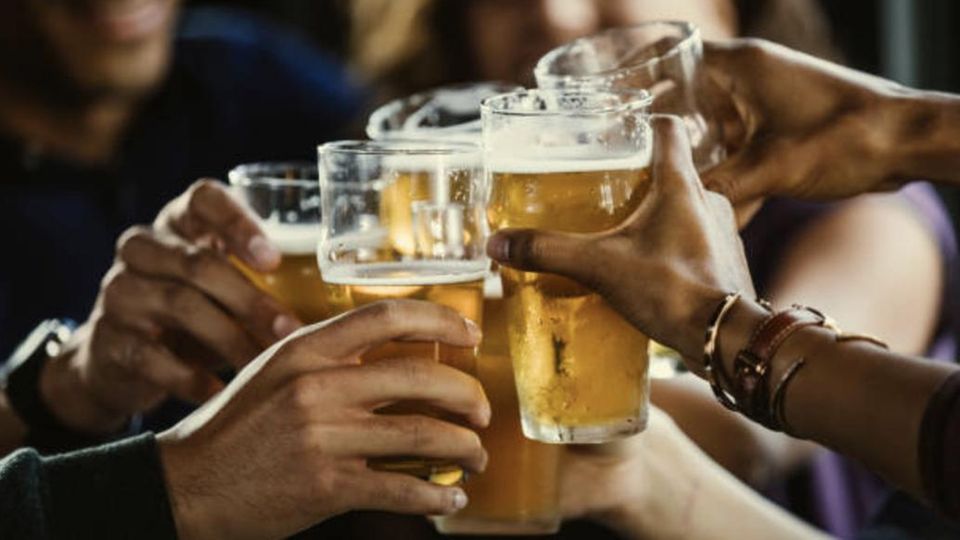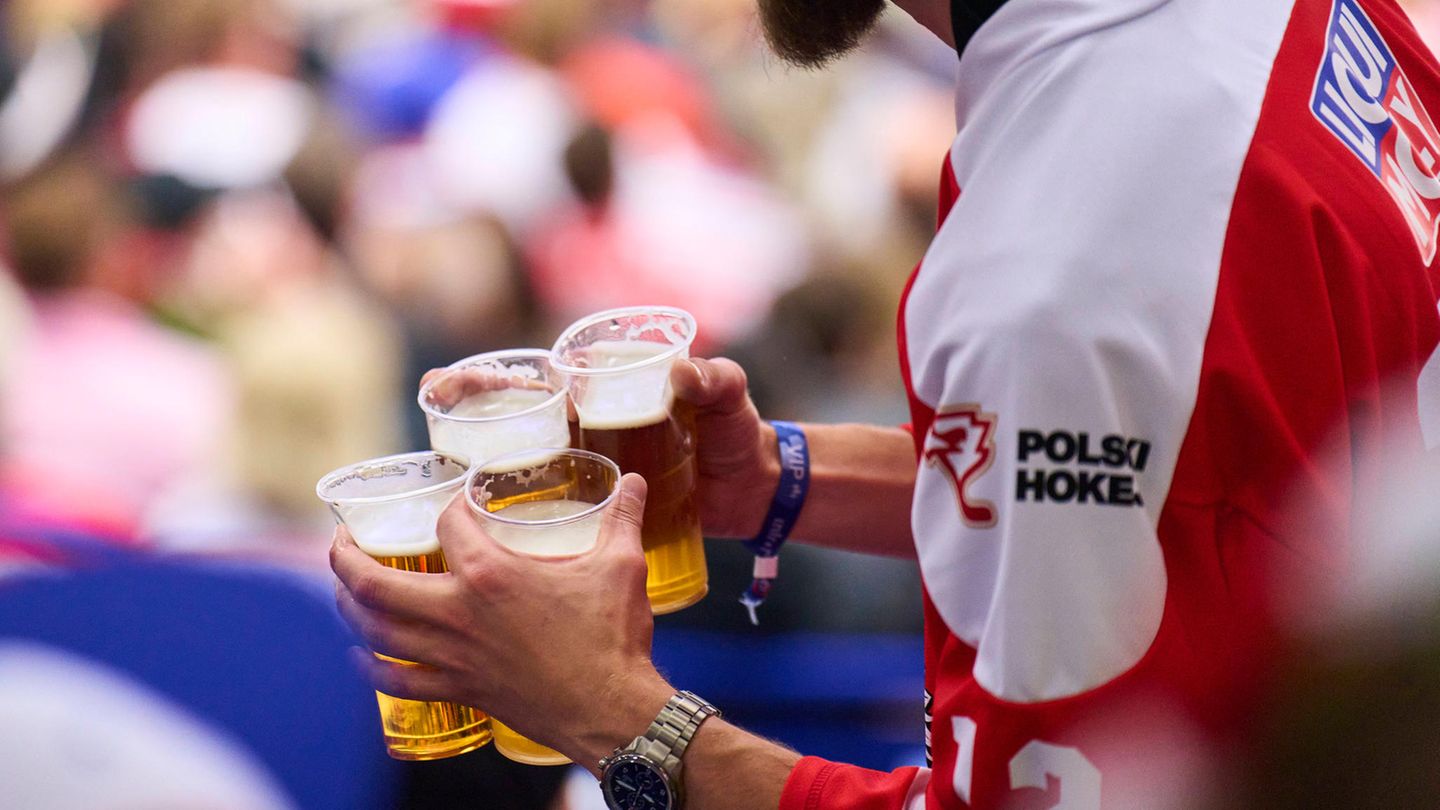Germany is a “high alcohol consumption country,” warn addiction experts in a new campaign. This has serious consequences for alcohol drinkers – but also for those around them. Thousands of babies are born every year with alcohol damage.
A daughter who is afraid that her drunk mother will lose her temper or an employee who has to step in for a colleague who is absent because of alcohol: the “number one drug” does not “only” harm the approximately nine million people with problematic alcohol consumption, but also burdens and endangers many third parties in practically all areas of life, emphasized the German Center for Addiction Issues (DHS) in Hamm on Thursday at the upcoming start of a campaign week. DHS, the German Medical Association (BÄK), the Federal Chamber of Psychotherapists, the German Psychiatric Association (DGPPN) and the DG-Addiction called for noticeable price increases for alcoholic beverages. There should be no more advertising for them and they should be less available, they warned in a joint position paper.
Around eight million relatives alone are affected by alcohol consumption and addictive behavior of a relative – the majority of these are problematic alcohol consumption, said DHS Managing Director Christina Rummel to the German Press Agency. These relatives are exposed to strong mood swings of the person close to them, feel helpless and alone, but at the same time are responsible for keeping up appearances and making up for mistakes. And: “In families with alcohol problems, violent attacks occur disproportionately often,” reported the DHS. Also serious: more than 2.6 million children and young people under the age of 18 have parents who abuse alcohol or are dependent on it.
Increasing consumption for decades
Germany is a “country with high alcohol consumption,” even if consumption has fallen over the past decades, said the DHS. Much more sensitivity is needed in dealing with alcohol – and awareness of the dangers. Germany is very fond of alcohol, said Rummel. The DHS is coordinating the action week – this time under the motto “Who is harmed by your drink?”. From Saturday, more than 800 events are to start almost nationwide from Aachen to Zwickau. The whole thing is under the patronage of the Federal Drug Commissioner Burkhard Blienert. Many organizations, state health ministries and addiction support networks are cooperating.
Concrete example of action: In the most populous federal state of North Rhine-Westphalia, the police and Caritas are offering a traffic course under simulated alcohol influence. In Essen, training courses are being held for managers, in Düsseldorf, training courses for employees, the University of Bielefeld is providing information and self-tests, and the Bottrop City Library has prepared a book table. Some of the support services nationwide are also aimed at children and young people. There are to be prevention days in schools and companies. Addiction support and self-help groups are available locally.
Who is harmed by other people’s alcohol consumption?
On the subject of the workplace, the DHS also uses posters to point out that “alcohol slows down thinking.” This leads to mistakes, production downtime, and high levels of sickness, Rummel said. Employees become increasingly dissatisfied when they have to make up for absences and deficiencies. The DHS has prepared discussion aids and materials. “There is huge interest among companies and businesses.” There is a strong rethinking going on.
In traffic, several thousand accidents involving personal injuries caused by alcohol every year also seriously injure many innocent bystanders, as experts point out. Alcohol consumption also encourages violence and crime. In their joint position paper, the DHS, BÄK and the other signatories make it clear: “The consequences of alcohol consumption are an enormous burden on public health, social coexistence and the national economy.” In Germany, excessive amounts of alcohol are consumed, and the general conditions are “extremely conducive to consumption.”

The social pressure of drinking – how hard is it to say no?
14:57 min
Children are heavily burdened – and the unborn child always drinks with
According to Christina Rummel, the approximately 2.65 million minors whose parents abuse alcohol or are addicted to alcohol often experience something like this when they grow up: “They have no support, there is no continuity for them, they grow up in an environment that is characterized by uncertainty.” It is not uncommon for them to have to look after their parents, have no real childhood – but are at an increased risk of developing an alcohol problem themselves later in life.
Another sad reality: According to DHS figures, around 10,000 children are born in Germany every year with alcohol damage. They have an incurable fetal alcohol spectrum disorder (FASD), can be noticeably thin or have severe mental disabilities. A total of around 1.5 million people are affected by FASD. When it comes to alcohol, this is especially true for pregnant women: “There is no safe amount.”
Every sip is harmful
It was also said that alcohol consumption causes economic damage of around 57 billion euros per year, which society bears. This includes a good 40 billion euros in direct expenses for hospitals, nursing care or rehabilitation, as well as indirect costs of more than 16 billion euros due to unemployment or production losses. Alcohol consumption is far too rarely critically questioned and is still considered “completely normal,” criticized the Federal Drug Commissioner Blienert (SPD). But: “Every sip is harmful to health and we must call it that,” he demanded in a statement.
Illustrated book “Alcohol & Tobacco”
How advertising seduces us to intoxication and smoking
“Health policy and the health system as well as relevant social actors must do more to reduce alcohol consumption overall and the associated consequences for consumers, the social environment and society,” the position paper said. “Thinning out the density of sales outlets, also in the sense of introducing licensed shops, is a sensible measure.” And: “The federal government is called upon to implement a complete ban on advertising for alcohol.”
Source: Stern
I’m Caroline, a journalist and author for 24 Hours Worlds. I specialize in health-related news and stories, bringing real-world impact to readers across the globe. With my experience in journalism and writing in both print and online formats, I strive to provide reliable information that resonates with audiences from all walks of life.




